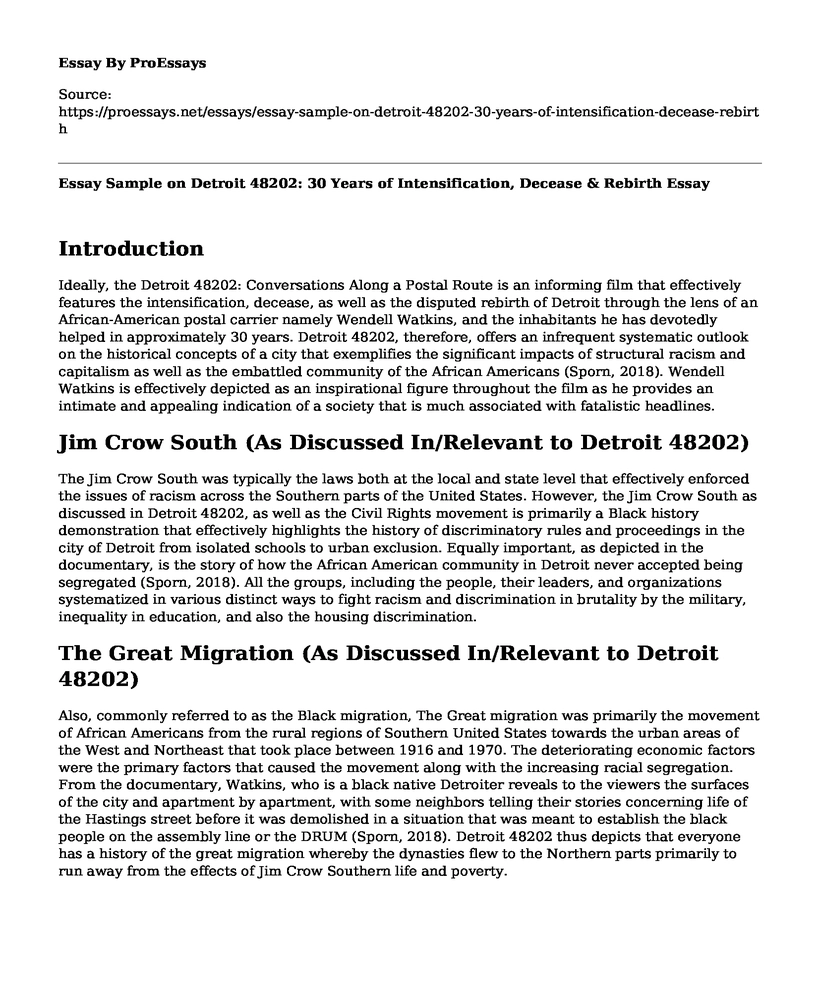Introduction
Ideally, the Detroit 48202: Conversations Along a Postal Route is an informing film that effectively features the intensification, decease, as well as the disputed rebirth of Detroit through the lens of an African-American postal carrier namely Wendell Watkins, and the inhabitants he has devotedly helped in approximately 30 years. Detroit 48202, therefore, offers an infrequent systematic outlook on the historical concepts of a city that exemplifies the significant impacts of structural racism and capitalism as well as the embattled community of the African Americans (Sporn, 2018). Wendell Watkins is effectively depicted as an inspirational figure throughout the film as he provides an intimate and appealing indication of a society that is much associated with fatalistic headlines.
Jim Crow South (As Discussed In/Relevant to Detroit 48202)
The Jim Crow South was typically the laws both at the local and state level that effectively enforced the issues of racism across the Southern parts of the United States. However, the Jim Crow South as discussed in Detroit 48202, as well as the Civil Rights movement is primarily a Black history demonstration that effectively highlights the history of discriminatory rules and proceedings in the city of Detroit from isolated schools to urban exclusion. Equally important, as depicted in the documentary, is the story of how the African American community in Detroit never accepted being segregated (Sporn, 2018). All the groups, including the people, their leaders, and organizations systematized in various distinct ways to fight racism and discrimination in brutality by the military, inequality in education, and also the housing discrimination.
The Great Migration (As Discussed In/Relevant to Detroit 48202)
Also, commonly referred to as the Black migration, The Great migration was primarily the movement of African Americans from the rural regions of Southern United States towards the urban areas of the West and Northeast that took place between 1916 and 1970. The deteriorating economic factors were the primary factors that caused the movement along with the increasing racial segregation. From the documentary, Watkins, who is a black native Detroiter reveals to the viewers the surfaces of the city and apartment by apartment, with some neighbors telling their stories concerning life of the Hastings street before it was demolished in a situation that was meant to establish the black people on the assembly line or the DRUM (Sporn, 2018). Detroit 48202 thus depicts that everyone has a history of the great migration whereby the dynasties flew to the Northern parts primarily to run away from the effects of Jim Crow Southern life and poverty.
Housing Crisis (As Discussed In/Relevant to Detroit 48202)
Notably, Detroit 48202 features the devastating recent hard moments of the city, ranging from the bankruptcy to battling for the rights of the workers and the racial discrimination in sectors of employment and housing (Sporn, 2018). The documentary significantly informs of the housing crisis in the city as one point Sporn states that "there has been a pushback to occupy the space meant for more local market units with some people claiming that affordable housing for the seniors is not necessary for maintaining our neighborhoods."
Redlining + Gentrification (As Discussed In/Relevant to Detroit 48202)
The documentary is indeed a critical tool for both the community organizers and the teachers whose substantial work is to emphasize on gentrification as well as redlining or segregation. The documentary, however, portrays the natural tension happening between the New Center, which is a vast region that is still experiencing an economic downturn and the Middletown, which is a gentrifying locality on the rebound (Sporn, 2018). The film also sheds some light on the effects of redlining along with the fragility associated with Black homeownership and the struggle for obtaining housing justice.
Labor Abuses + Labor Organizing (As Discussed In/Relevant to Detroit 48202)
Wendell Watkins is at the center of the documentary representing a mail carrier who works routinely, and his primary role is to control a team of labor organizers (Sporn, 2018). The film also reveals instances of labor abuse whereby the resilient Detroiters convey their stores of resistance in this challenging environment of living on decreased pensions and industrial disinvestment.
Deindustrialization (As Discussed In/Relevant to Detroit 48202)
Deindustrialization is adequately described as the decline in the industrial activities or the economy of a particular region. The documentary depicts deindustrialization in Detroit, whereby the impacts of the situation are distributed unevenly (Sporn, 2018). The film essentially demonstrates the increase, decline, and challenged recovery of Detroit.
Globalization (As Discussed In/Relevant to Detroit 48202)
Globalization is primarily the process through which organizations grow internationally and operate on a global scale. The film offers a luxurious texture overview of Detroit, which is the first central post-industrial city in the United States.
Reference
Sporn, P. (2018). "Detroit 48202: Conversations Along A Postal Route Documentary." https://vcu.kanopy.com/product/detroit-48202
Cite this page
Essay Sample on Detroit 48202: 30 Years of Intensification, Decease & Rebirth. (2023, May 09). Retrieved from https://proessays.net/essays/essay-sample-on-detroit-48202-30-years-of-intensification-decease-rebirth
If you are the original author of this essay and no longer wish to have it published on the ProEssays website, please click below to request its removal:
- Grave of the Fireflies - Movie Review Example
- Some Like It Hot Film Essay
- Movies Analysis Essay on Taxi Driver, Manhattan and the Downtown 81
- Essay Example on Unsolved Mystery: Mr. Holmes' Inhuman Nature
- Hacksaw Ridge - Movie Analysis Essay
- Paper Example on Constructing Quality Structures: The Art & Science
- Music: Art of Meaningful Sounds, Universal & Essential - Research Paper Example







